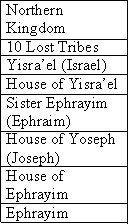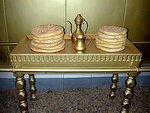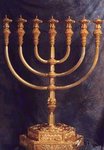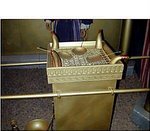Think about the parable of the Prodigal Son. There's a Father with 2 sons. One thinks he can go out on his own and make it in the world without the guidance of his Father (Ephrayim). The other stays with the Father guarding His ways (Judah). When the Prodigal comes back, he is welcomed with open arms and much rejoicing! But the brother (Judah) is upset because here he kept the ways and yet the one who left and lived his life the way he wanted gets the best of everything! The Father tells the brother (Judah) that he has always had these things and will continue to have them. But that this miracle of the lost brother is something to rejoice over! Now let’s just live as one happy family!
There are two groups in Israel today. One group is still jealous of Ephrayim and feels they are forever lost and have no desire to share the land with them. However, the other group prays for the return of Ephrayim. They know that when Ephrayim returns that means Messiah will come! They do not realize that it will be His second coming, but they long for Him to come none the less.

The Jews look for the promise of Messiah in that He would come as Messiah ben Yoseph and as Messiah ben David. Meaning Messiah as the suffering servant Joseph and Messiah as the son of David, a King. “Ben” is Hebrew for son. Our Pastor is named Benjamin as was his father. So he is Ben ben Ben. :-) We who know that Yahshua is the Messiah can see how He has fulfilled the role of suffering servant and we have the expectation and promise that He will return as the King!
Now let’s look at the ministry of the disciples. Sha’ul (Paul), Kepha (Peter) and the other talmidim (disciples) were sharing the gospel with Gentiles. Where else are you going to find the seed of Ephrayim, except among the Gentiles filling the globe? Amos 9:9 tells us that though scattered among the Gentiles, not one grain, or person, will fall to be destroyed. In other words they will not disappear from the earth, but will mix and literally become the peoples of the earth, only to be brought back to Yahweh in the end times, on an individual basis. The Great Commission (Matt: 28 18-20) is a world wide search for the seed of Ephrayim, the sand of the sea, dust of the earth, the teeming multitudes of humanity. Part of that search of course will be to look for the dispersed of Judah as well. Ya’akov (James) testifies to this truth by reminding the Jerusalem Council that Yahweh was just visiting the Gentile nations through the preaching of the gospel, not to live there, but to rescue and pull out His people, called by His Name (Acts 15:14-17). Through this rescue James reminds us that Yahweh is rebuilding The Tabernacle of David made up of all the twelve tribes of Israel. Since He is Israel's Elohim, He is pulling out and rescuing Israelites from the "outcast” status that had been their inheritance due to their disobedience to Torah. These people are Israelites regardless of whether they themselves realize it or not. Isn’t that what it means to be lost? Lost spiritually as well as physically?
Acts 15:15-17 “And the words of the prophets agree with this, as it has been written: ‘After this I shall return and rebuild the Booth of David which has fallen down. And I shall rebuild its ruins, and I shall set it up, so that the remnant of mankind shall seek Yahweh, even all the gentiles on whom My Name has been called, says Yahweh who is doing all this,’
Isn’t it fascinating that after Yahshua's earthly ministry, as He is about to ascend back to heaven, the remaining eleven talmidim come to Him and ask Him the same exact question? This is almost unimaginable since these eleven rarely agreed on anything and were always fighting and asking questions, seeking to bolster their own agenda. Yet in total unanimity they all had the same final question. “Master, will you at this time restore the kingdom to Israel?” Acts1:6. That is what they were concerned with. Not the creation or building of a separate entity called "the church" which has sought to replace, annihilate and often destroy the Yahudahite people. Let it be clearly understood that the word "church" is nothing more than the ekklesia or assembly of the Tanach. It is the same assembly that was receiving Torah on Mt. Sinai (Acts 7:37-38). There is one Renewed Covenant assembly, called Israel by Shaul (Galatians 6:16). In Spanish and Portuguese and almost every language ekklesia means "called out ones" and maintains the basic idea of an assembly. Yahshua did not come to build something new called "the church", nor start some new religion. He came to rebuild the mikra or assembly of the Tanach (TaNaK basically is what’s called the Old Testament) and fill it with power. When the Septuagint translation of the Tanach was translated from Hebrew to Greek around 175 B.C.E., every translator translated the word mikra into ekklesia (which means assembly) and that is exactly what Yahshua Himself claims to have come to build (Matthew 16:16-19).

The Gospel is not merely a proclamation of personal salvation. It is a message of national restoration to Israel from a divided family which manifested itself in two still separate houses of Israel. Matthew 24:14 reminds us that the Gospel is the “Gospel of the Kingdom”. In Matthew 12, Yahshua speaks of the principal of a divided house without any ability to withstand the fiery darts of Satan. In Luke 24:21 the talmidim were very disappointed since they fully and rightfully expected the twelve tribes to be restored under Yahshua the Messiah. Where would they get that idea? In Jeremiah 23 verses 3-6, Yahweh declares that He will bring Israel and Judah back from global dispersion in the days that Messiah arrives. In verse 5 and 6 it states that Judah shall be saved and Israel shall dwell safely. We see the reunification of both houses under the Messiah or the reunification of all twelve tribes all living in the land of Israel. Remember that in order for the House of David to be fully restored and rebuilt it has to be composed of the same composition that left Egypt, received Torah and made up the days of King David. All twelve tribes! Any revival or restoration movement that does not include the full restoration of all twelve parts of the family and merely focuses in on two of the twelve parts is not flowing in the full vision of restoration.
In order to experience the last days blessings and protection of Yahweh, we must expand our vision to include all of Israel. Is it not interesting that the promised “Renewed Covenant” of Jeremiah 31:31-34 talks about Yahweh cutting a covenant with the House of Israel and the House of Judah, and never once mentions cutting one with Gentiles. The House of Israel mentioned in Jeremiah is Ephraim, those born-again non-Jews. Remember that all Jews are Israelites but not all Israelites are Jews. In the heavenly Jerusalem of Revelation 21:12 notice that all those born again folks planning on having everlasting life must enter the city through one of 12 gates, one for each of the twelve tribes. There are no other gates by which to enter. The reason is that everyone in Renewed Covenant Israel from both sides of the physical family is a descendent of Israel.
In Jeremiah 31:3-22 we read detailed descriptions of Ephraim (ten tribes) returning to the land. We see the ten tribes being replanted on the mountains of Israel. It was Yahshua Himself who promised the twelve talmidim a millennial rule over twelve verifiable and recognizable tribes of re-gathered Israel (Matthew 19:28). Zechariah in chapter 8:22-23, specifically refers to ten men, representing the ten returning tribes grabbing the tzitzit (fringes) of a Jew (Messiah) and declaring that they will also return to Zion and Torah. Notice that these ten returning men speak all of the world's known languages. In this passage we see the ongoing return of all Israel, to Israel!
In Yaakov (James) 1:1, Yaakov writes his epistle to the 12 tribes scattered abroad. If the ten tribes remained lost and nowhere to be found why would James write to them and call them brethren of faith in verse 2? Obviously he had no problem with the body of Yahshua being Renewed Covenant Israel, made up of all twelve tribes and perhaps some very few exceptions. He would never have written a letter to people that had disappeared from the earth or didn't exist.
 Was it just Yahshua and James that had this revelation? In 1 Peter 1:1, Kepha writes to the chosen people living in the Diaspora. The Jewish Diaspora did not happen until 20 years after this epistle was written in about 50 AD. Yet he refers to these other ten tribes' descendants who have come to faith as "the chosen people". Could it be that Ephraim is just as chosen as Judah? You thought that only two tribes (Jews) were chosen? The scriptures never once calls the Jewish people chosen. Rather it calls all Israel, of which the Jews are but two parts, the chosen people! Jeremiah 33:24 confirms this truth. Yahweh states that he has chosen two houses or two clans or two nations! That is the House of Israel and the House of Judah. Peter wrote to the re-gathered House of Israel when addressing his epistle!
Was it just Yahshua and James that had this revelation? In 1 Peter 1:1, Kepha writes to the chosen people living in the Diaspora. The Jewish Diaspora did not happen until 20 years after this epistle was written in about 50 AD. Yet he refers to these other ten tribes' descendants who have come to faith as "the chosen people". Could it be that Ephraim is just as chosen as Judah? You thought that only two tribes (Jews) were chosen? The scriptures never once calls the Jewish people chosen. Rather it calls all Israel, of which the Jews are but two parts, the chosen people! Jeremiah 33:24 confirms this truth. Yahweh states that he has chosen two houses or two clans or two nations! That is the House of Israel and the House of Judah. Peter wrote to the re-gathered House of Israel when addressing his epistle!There is still so much more to discuss about the 2 Houses of Israel. I knew this subject would take several months to go though so I ask that you hang on, continue to read and learn maybe some things you have never heard before. The answer to the question are we Jewish, are we Hebrew, is YES! We are both! However your neighbor may not be Jewish, but he/she could certainly be Hebrew!
Blessings once again.
Portions of this article taken from “Two House 101” by Ben Ehrhardt. His complete teaching and other teachings can be found on www.hearoisrael.org














